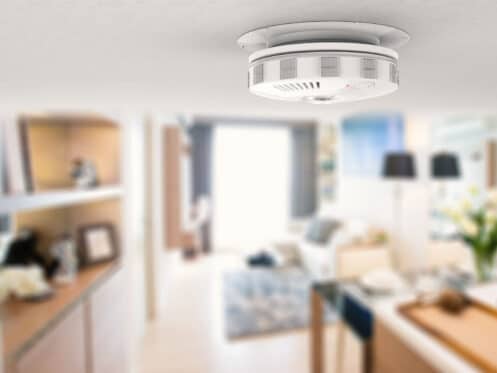Nothing steals the peace from your Tacoma, WA home like the infernal, incessant beeping of a smoke detector. Smoke detector alarms are meant to be annoying. After all, if they blended seamlessly into the background, they wouldn’t compel immediate action. However, when there’s no smoke, no fire, and no reason to exit the building, a smoke detector that talks to you non-stop can prove downright maddening.
The good news is that there’s always a reason why these devices sound their alarms, and there’s always a way to quiet them. Find out what your current problem might be and what you can do to solve it.
It’s Time to Replace the Batteries
Among the most common causes of errant smoke detector noises are dead or dying batteries. Fortunately, low-battery alerts have a distinctly different sound from emergency alarms. When smoke is actually detected, you’ll hear a loud, three-beep pattern played over and over again. When their batteries are low, smoke detectors emit a single, sharp chirp every 30 to 60 seconds.
Although the sound interrupts television programs, halts quiet conversations, and wakes sleeping babies, smoke detectors chirp as a fail-safe measure. Their chirping ensures that you don’t forget to make essential battery replacements. Unfortunately, while their batteries may be low, they have enough juice to pester homeowners for quite a long time. Even standard smoke detectors can send out low-battery alerts every 30 to 60 seconds for at least seven days.
To avoid the hassle of low-battery alerts and harried, hasty battery replacements, inspect your smoke detectors every 30 days, and swap their batteries out every six to 12 months.
How Excess Moisture Affects Your Smoke Detectors
With outdoor humidity levels often ranging between 70% and 90%, you may also have high humidity inside your home. In general, it’s best to keep your indoor humidity between 30% and 50%. If you have a central HVAC system and keep it well maintained, your furnace, air conditioner, or heat pump should handle humidity regulation for you. However, if you have a large household and lots of people are taking hot baths and steamy showers, you might need a little additional support from an integrated, whole-house dehumidifier.
Even many sophisticated smoke detectors cannot distinguish between smoke and steam. To these devices, there’s no discernible difference between moisture particles and smoke particles. If your emergency fire alarm keeps getting triggered by your cooking projects or your post-workout showers, consider cleaning your bathroom exhaust vents and your range hood fan, and use these features consistently.
Take Out Your Smoke Detector’s Pull Tab
Simple, standard smoke detectors are mounted to upper walls or ceilings, and they obtain their power supplies from batteries only. There are also smoke detectors and combination smoke detectors that are hardwired directly into residential electrical systems. If you have a new smoke detector that was recently attached to your home’s electrical power, you’ll have to remove its battery pull tab to activate this device. Until you do, this unit will continue to chirp out alerts, but it won’t issue an alarm if an actual fire occurs.
Buildups of Dirt, Dust, Lint, and Other Debris
Given that many smoke detectors can’t distinguish between overly moist air and smoke, it shouldn’t be surprising that these units can’t distinguish between smoke and dust particulates either. Buildups of dust, dirt, dander, and other airborne debris can trigger the incredibly sensitive sensors in these devices. You can try resolving the problem by gently cleaning the exterior of your smoke detectors. You can also use a clean cotton swab to carefully wipe out the interior of their sensing chambers. However, if the beeping quickly resumes after you’ve tried these measures, it’s probably a good idea to either improve your indoor air quality (IAQ) or replace your smoke detectors.
The Residual Charge Needs to Be Drained
If you responded to a persistent chirping sound and replaced your smoke detector’s battery, there’s still a good chance that this device will continue to go off. Smoke detectors that aren’t hardwired into homes and run solely on battery power always have a small, reserve charge in store. This is what keeps them going for days when issuing low-battery alerts. To stop the annoying sound, you’ll need to open the unit back up, remove its new battery, and press and hold its “TEST” or “RESET” button for at least 30 seconds.
If replacing the battery and resetting the residual charge don’t work, you might have a defective detector on your hands. Smoke detectors typically last between eight and 10 years. If yours is still under warranty, you can ask the manufacturer to replace it at no cost.
You Have a Carbon Monoxide Leak in Your Home
Whether you purchased an existing house that already had smoke detectors installed or you’ve just moved into a new home with hard-wired smoke detectors throughout, it’s important for you and every other member of your household to learn:
- Where these units are
- What they’re capable of detecting
- Which sounds they make
- What each of their noises means
An increasing number of builders and homeowners are opting to install combination (combi) smoke alarms. These devices detect both smoke and carbon monoxide. Combi alarms take up less space than two separate units, and they’re a lot easier to maintain.
If you have combi detectors in your home, three loud beeps that repeat indicate smoke, and four loud beeps that repeat indicate carbon monoxide (CO). Carbon monoxide is an odorless, colorless gas that’s produced by fuel-combusting appliances. It forms when fuels like wood, coal, gas, and heating oil are incompletely burned. Although appliances like furnaces, water heaters, and gas stoves vent CO outdoors, there’s always the risk of having these appliances malfunction or having a backdraft develop that pulls exhaust gases indoors. In all cases, if your smoke detector repeatedly emits four rapid beeps, exit the home and call 911.
Dramatic Changes in Temperature and Your Smoke Detector
Most smoke detectors perform best when the indoor temperature is between 40 and 100 degrees Fahrenheit. Fortunately, it’s unlikely that the interior of your home will ever be much colder or hotter than this. However, if your HVAC system ever fails or your power goes out, you could find yourself dealing with both uncomfortable living conditions and a smoke detector that won’t shut up. This is especially true in winter.
Cold temperatures affect the functionality of smoke detector batteries, even when they’re new. As indoor temperatures near freezing, the chemical reactions within these batteries slow down, and smoke detectors register them as having a low charge.
What Not to Do When Your Smoke Detector Starts Chirping Nonstop
Many consumers believe that the easiest solution to a noisy smoke detector is to pull it down and take its batteries out. However, deactivating a smoke detector is the absolute worst thing you can do. If you don’t remember to put the batteries back in or reset them, your smoke detector cannot alert you in case of emergency.
At Hunt’s Services, we proudly serve Tacoma, WA and the surrounding areas, offering a complete range of HVAC, plumbing, sewer, and electrical services. We also provide whole-house surge protection, EV charging stations, and smoke detector installation. To schedule an appointment, get in touch with our team at Hunt’s Services today.




